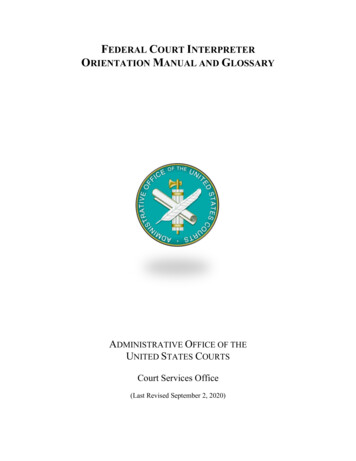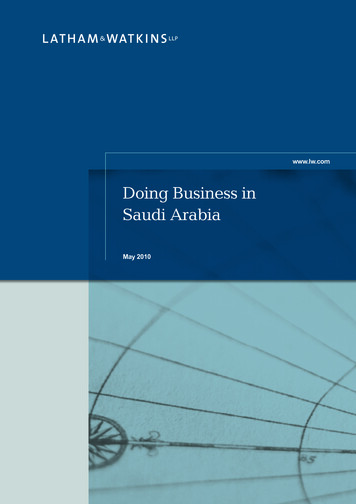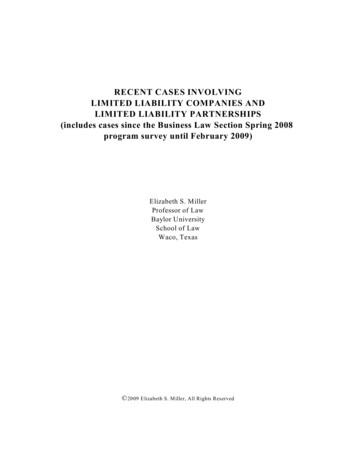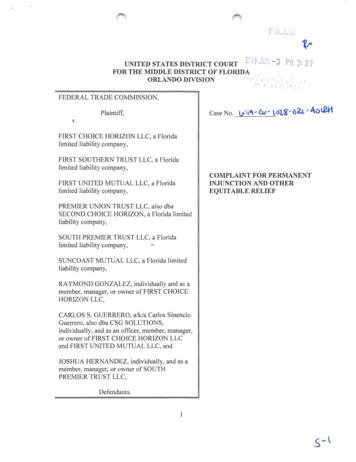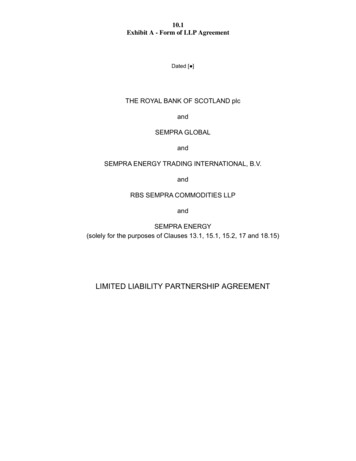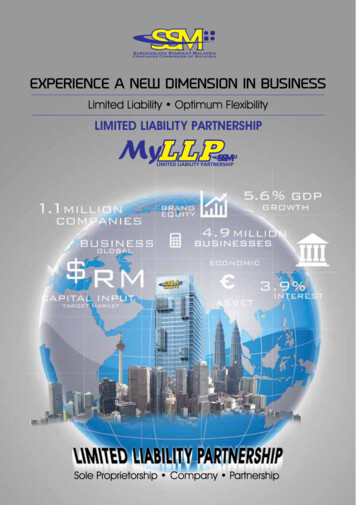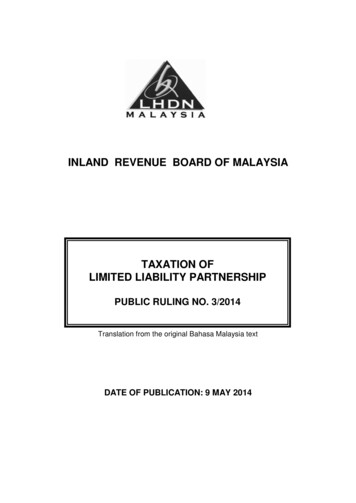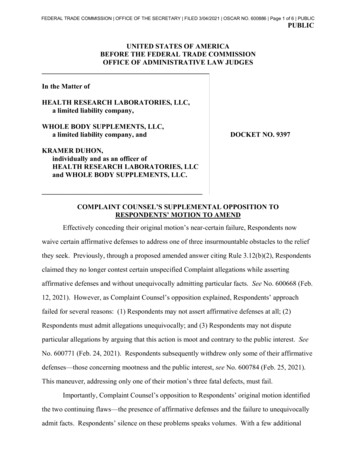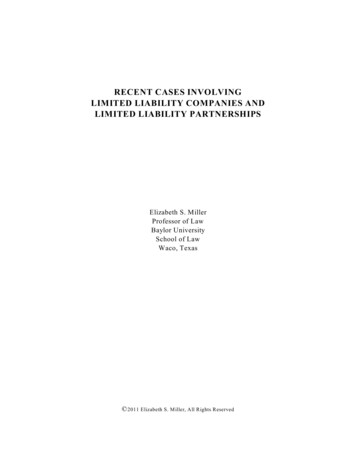
Transcription
RECENT CASES INVOLVINGLIMITED LIABILITY COMPANIES ANDLIMITED LIABILITY PARTNERSHIPSElizabeth S. MillerProfessor of LawBaylor UniversitySchool of LawWaco, Texas 2011 Elizabeth S. Miller, All Rights Reserved
Table of ContentsPageI.Limited Liability Partnerships. . . . . . . . . . . . . . . . . . . . . . . . . . . . . . . . . . . . . . . . . . . . . . . . . . . .A.Diversity Jurisdiction. . . . . . . . . . . . . . . . . . . . . . . . . . . . . . . . . . . . . . . . . . . . . . . . . . . .B.Standing or Capacity to Sue or Be Sued. . . . . . . . . . . . . . . . . . . . . . . . . . . . . . . . . . . . . .C.Pro Se Representation. . . . . . . . . . . . . . . . . . . . . . . . . . . . . . . . . . . . . . . . . . . . . . . . . . . .D.Limited Liability of Partners. . . . . . . . . . . . . . . . . . . . . . . . . . . . . . . . . . . . . . . . . . . . . . .E.Foreign LLPs. . . . . . . . . . . . . . . . . . . . . . . . . . . . . . . . . . . . . . . . . . . . . . . . . . . . . . . . . . .II.Limited Liability Companies. . . . . . . . . . . . . . . . . . . . . . . . . . . . . . . . . . . . . . . . . . . . . . . . . . . . . 3A.Diversity Jurisdiction. . . . . . . . . . . . . . . . . . . . . . . . . . . . . . . . . . . . . . . . . . . . . . . . . . . . 3B.Personal Jurisdiction. . . . . . . . . . . . . . . . . . . . . . . . . . . . . . . . . . . . . . . . . . . . . . . . . . . . . 3C.Service of Process. . . . . . . . . . . . . . . . . . . . . . . . . . . . . . . . . . . . . . . . . . . . . . . . . . . . . . . 5D.Venue. . . . . . . . . . . . . . . . . . . . . . . . . . . . . . . . . . . . . . . . . . . . . . . . . . . . . . . . . . . . . . . . . 7E.Standing/Authority to Sue. . . . . . . . . . . . . . . . . . . . . . . . . . . . . . . . . . . . . . . . . . . . . . . . . 7F.Pro Se Representation. . . . . . . . . . . . . . . . . . . . . . . . . . . . . . . . . . . . . . . . . . . . . . . . . . . . 9G.Derivative Suits. . . . . . . . . . . . . . . . . . . . . . . . . . . . . . . . . . . . . . . . . . . . . . . . . . . . . . . . 10H.Necessary Parties. . . . . . . . . . . . . . . . . . . . . . . . . . . . . . . . . . . . . . . . . . . . . . . . . . . . . . . 14I.Stay of Proceedings. . . . . . . . . . . . . . . . . . . . . . . . . . . . . . . . . . . . . . . . . . . . . . . . . . . . . 14J.Arbitration. . . . . . . . . . . . . . . . . . . . . . . . . . . . . . . . . . . . . . . . . . . . . . . . . . . . . . . . . . . . 15K.Claim Preclusion. . . . . . . . . . . . . . . . . . . . . . . . . . . . . . . . . . . . . . . . . . . . . . . . . . . . . . . 18L.Nature of LLC. . . . . . . . . . . . . . . . . . . . . . . . . . . . . . . . . . . . . . . . . . . . . . . . . . . . . . . . . 18M.Formation or Failure to Form LLC. . . . . . . . . . . . . . . . . . . . . . . . . . . . . . . . . . . . . . . . . 19N.Pre-Formation Transactions. . . . . . . . . . . . . . . . . . . . . . . . . . . . . . . . . . . . . . . . . . . . . . 20O.Limited Liability of LLC Members and Managers/Personal Liability Under Agency orOther Principles. . . . . . . . . . . . . . . . . . . . . . . . . . . . . . . . . . . . . . . . . . . . . . . . . . . . . . . . 21P.LLC Veil Piercing. . . . . . . . . . . . . . . . . . . . . . . . . . . . . . . . . . . . . . . . . . . . . . . . . . . . . . 27Q.Authority of Member, Manager, or Agent. . . . . . . . . . . . . . . . . . . . . . . . . . . . . . . . . . . 35R.Admission of Member. . . . . . . . . . . . . . . . . . . . . . . . . . . . . . . . . . . . . . . . . . . . . . . . . . . 39S.LLC Property/Interest of Member. . . . . . . . . . . . . . . . . . . . . . . . . . . . . . . . . . . . . . . . . . 41T.Fiduciary Duties of Members and Managers. . . . . . . . . . . . . . . . . . . . . . . . . . . . . . . . . 43U.Inspection and Access to Information. . . . . . . . . . . . . . . . . . . . . . . . . . . . . . . . . . . . . . . 62V.Interpretation of Operating Agreement. . . . . . . . . . . . . . . . . . . . . . . . . . . . . . . . . . . . . . 64W.Transfer of Interest/Buy-Out of Member. . . . . . . . . . . . . . . . . . . . . . . . . . . . . . . . . . . . 83X.Capital Contributions and Contribution Obligations. . . . . . . . . . . . . . . . . . . . . . . . . . . 88Y.Improper Distributions. . . . . . . . . . . . . . . . . . . . . . . . . . . . . . . . . . . . . . . . . . . . . . . . . . 90Z.Withdrawal, Expulsion, or Termination of Member. . . . . . . . . . . . . . . . . . . . . . . . . . . . 91AA.Dissolution and Winding Up. . . . . . . . . . . . . . . . . . . . . . . . . . . . . . . . . . . . . . . . . . . . . . 96BB.Judicial or Administrative Dissolution. . . . . . . . . . . . . . . . . . . . . . . . . . . . . . . . . . . . . . 99CC.Accounting. . . . . . . . . . . . . . . . . . . . . . . . . . . . . . . . . . . . . . . . . . . . . . . . . . . . . . . . . . 103DD.Professional LLCs. . . . . . . . . . . . . . . . . . . . . . . . . . . . . . . . . . . . . . . . . . . . . . . . . . . . . 104EE.Foreign LLC – Failure to Qualify to Do Business. . . . . . . . . . . . . . . . . . . . . . . . . . . . 104FF.Foreign LLC – Governing Law. . . . . . . . . . . . . . . . . . . . . . . . . . . . . . . . . . . . . . . . . . . 105GG.Charging Order. . . . . . . . . . . . . . . . . . . . . . . . . . . . . . . . . . . . . . . . . . . . . . . . . . . . . . . 107ii111112
.Divorce of Member. . . . . . . . . . . . . . . . . . . . . . . . . . . . . . . . . . . . . . . . . . . . . . . . . . . .Receivership. . . . . . . . . . . . . . . . . . . . . . . . . . . . . . . . . . . . . . . . . . . . . . . . . . . . . . . . .Bankruptcy. . . . . . . . . . . . . . . . . . . . . . . . . . . . . . . . . . . . . . . . . . . . . . . . . . . . . . . . . .Fraudulent Transfer. . . . . . . . . . . . . . . . . . . . . . . . . . . . . . . . . . . . . . . . . . . . . . . . . . . .Creditor’s Rights. . . . . . . . . . . . . . . . . . . . . . . . . . . . . . . . . . . . . . . . . . . . . . . . . . . . . .Securities Laws. . . . . . . . . . . . . . . . . . . . . . . . . . . . . . . . . . . . . . . . . . . . . . . . . . . . . . .Worker’s Compensation. . . . . . . . . . . . . . . . . . . . . . . . . . . . . . . . . . . . . . . . . . . . . . . .Right to Financial Privacy. . . . . . . . . . . . . . . . . . . . . . . . . . . . . . . . . . . . . . . . . . . . . . .Real Estate Transfer Laws. . . . . . . . . . . . . . . . . . . . . . . . . . . . . . . . . . . . . . . . . . . . . . .Wage and Employment Statutes. . . . . . . . . . . . . . . . . . . . . . . . . . . . . . . . . . . . . . . . . .Insurance. . . . . . . . . . . . . . . . . . . . . . . . . . . . . . . . . . . . . . . . . . . . . . . . . . . . . . . . . . . .Statute of Frauds. . . . . . . . . . . . . . . . . . . . . . . . . . . . . . . . . . . . . . . . . . . . . . . . . . . . . .Unfair Trade Practices. . . . . . . . . . . . . . . . . . . . . . . . . . . . . . . . . . . . . . . . . . . . . . . . . .Tortious Interference. . . . . . . . . . . . . . . . . . . . . . . . . . . . . . . . . . . . . . . . . . . . . . . . . . .Intracorporate Conspiracy. . . . . . . . . . . . . . . . . . . . . . . . . . . . . . . . . . . . . . . . . . . . . . .Conversion/Merger/Reorganization. . . . . . . . . . . . . . . . . . . . . . . . . . . . . . . . . . . . . . .Single Member’s Employment Tax Liability/Validity of Check-the-Box Regulations.YY.Passive Activity Rules. . . . . . . . . . . . . . . . . . . . . . . . . . . . . . . . . . . . . . . . . . . . . . . . . .ZZ.Gift Tax. . . . . . . . . . . . . . . . . . . . . . . . . . . . . . . . . . . . . . . . . . . . . . . . . . . . . . . . . . . . .AAA. Attorney Liability, Disqualification. . . . . . . . . . . . . . . . . . . . . . . . . . . . . . . . . . . . . . .BBB. Attorney Client Privilege. . . . . . . . . . . . . . . . . . . . . . . . . . . . . . . . . . . . . . . . . . . . . . . 24125125126126126
RECENT CASES INVOLVINGLIMITED LIABILITY COMPANIES ANDLIMITED LIABILITY PARTNERSHIPSBy Elizabeth S. MillerJanuary, 2011This paper includes summaries of cases that have appeared since the paper prepared for the 2010Limited Liability Entities program. The volume of case law overtook the author’s ability to prepare acomprehensive survey for the past twelve months, and the author is endeavoring to catch up on the “backlog”of cases in her possession. Past surveys of LLP and LLC cases may be accessed at the author’s facultyprofile page at the Baylor Law School web site at http://www.baylor.edu/law/. Additional surveys will beposted on the site periodically.I.Limited Liability PartnershipsA.Diversity JurisdictionLee v. Brown, No. 3:08-CV-01206 CSH, 2009 WL 3157542 (D. Conn. Sept. 25, 2009) (stating thatrule that partnership has citizenship of each of its partners for purposes of diversity jurisdiction applies toLLPs).B.Standing or Capacity to Sue or Be SuedRaskov v. Stapke & Harris, No. B215351, 2010 WL 522780 (Cal. App. 2 Dist. Feb. 16, 2010)(rejecting attempt to analogize State Bar’s termination of LLP’s certificate of registration to suspendedcorporation for purposes of determining firm’s standing to defend itself in declaratory judgment actionbecause rule in corporate context is statutory rule limited to corporations).C.Pro Se RepresentationJ & J Sports Productions, Inc. v. Sunsets on Sand, LLP, No. 10-cv-12-wmc, 2010 WL 1740803(W.D. Wis. April 29, 2010) (holding LLP could not appear pro se through partner who was not licensedattorney, and noting that purpose of engaging in business as LLP is to limit recovery to entity’s assets ratherthan assets of partners and requirement that LLP be represented by counsel did not preclude partner fromcontinuing to defend herself individually).D.Limited Liability of PartnersHenry v. Masson, S.W.3d , 2010 WL 5395640 (Tex. App. 2010). Henry and Masson werepartners in an orthopedic surgery practice. They formed their practice as an LLP in 2001, and personaldisputes led to litigation in 2003. During a hearing in the case, they agreed in principle to wind up the LLPand sever all ties between them. Additional disputes and issues arose, and another suit was filed. In anattempt to resolve all their differences, they executed a settlement agreement. Litigation ensued over allegedbreaches of the settlement agreement. Among the issues addressed in this appeal was a claim by Masson thatthe trial court erred in ordering Henry and Masson to make capital contributions to the partnership to allowthe partnership to pay out funds it had taken in that actually belonged to two new entities formed by theparties. Masson based his argument on the fact that the partnership was an LLP and the provision of the1
Texas Revised Partnership Act providing that partners in an LLP are protected from individual liability forthe debts and obligations of the partnership incurred while the partnership is an LLP. The court stated thatneither the partnership agreement nor the statute prevented the trial court from ordering contributions to thepartnership during winding up. According to the court, the payments the trial court ordered Henry andMasson to make were capital contributions to discharge debts of the partnership during winding up, not anadjudication of individual liability for the debts or obligations as contemplated by the statute. The courtrelied upon the partnership agreement, which provided that if no partner agreed to lend funds needed todischarge the partnership’s debts, obligations, and liabilities as they came due, each partner was required totimely contribute the partner’s proportionate share of funds needed. Masson argued that this provision wasnot intended to apply in the winding up process and that reference elsewhere in the partnership agreementto payment of the partnership’s debts upon dissolution “to the extent funds are available” evidenced thepartners’ intent that they would not be required to make additional capital contributions during the windingup. The court stated that the phrase relied upon by Masson appeared in a section referring to steps to betaken after the sale of partnership property, and the funds mentioned are funds received from the sale ofpartnership property. The court did not interpret the agreement to mean that sale of partnership property wasthe only source of funds to pay debts. The court also rejected Masson’s argument that the reference in thecapital contribution provision to payment of debts as they become “due and payable” was evidence that theparties did not intend to require capital contributions during winding up. The court stated that “due andpayable” simply modified the type of debt to be paid and did not limit the provision to “operational” statusof the partnership.J & J Sports Productions, Inc. v. Sunsets on Sand, LLP, No. 10-cv-12-wmc, 2010 WL 1740803(W.D. Wis. April 29, 2010) (noting that purpose of engaging in business as LLP is to limit recovery toentity’s assets rather than assets of partners and requirement that LLP be represented by counsel did notpreclude partner from continuing to defend herself individually).Edlinger v. United States, No. 3:10-cv-148, 2010 WL 1485951 (N.D.N.Y. April 14, 2010) (grantingsummary judgment in favor of partner in LLP because no allegation or evidence showed that partnerengaged in misconduct or directly supervised errant partner or that partnership agreement limited statutoryprotection provided by LLP, and partners in New York LLP are not liable for partnership debt, obligation,or liability absent wrongful conduct committed by partner himself, partner’s direct supervision of someonewho engaged in wrongful conduct, or limitation of scope of liability protection by partnership agreement).Vohra v. Cadigan Arbor Park, No. G040387, 2010 WL 1102428 (Cal. App. 4 Dist. March 25, 2010)(relying on California statutory provisions that provide partner in LLP is not liable for debts, obligations, orliabilities of partnership absent personal tort liability and that partner is not proper party in action againstLLP, and holding trial court did not err in non-suiting partner in LLP where there was no evidence partnerhad any personal involvement in partnership’s dealings with plaintiff).E.Foreign LLPsTotal Holdings USA, Inc. v. Curran Composites, Inc., C.A. No. 4494-VCS, 2009 WL 3238186(Del. Ch. Oct. 9, 2009) (interpreting governing law provisions of Section 15-106 of Delaware RevisedUniform Partnership Act and commenting regarding application of Section 15-106(b) to LLPs).2
II.Limited Liability CompaniesA.Diversity JurisdictionFederal courts of appeals and district courts continue to hold that an LLC has the citizenship of eachof its members for diversity jurisdiction purposes. The district court opinions to this effect are too numerousto list. Recent opinions in which circuit courts of appeals have applied or recognized the rule that an LLC’scitizenship is determined by that of all its members include: V & M Star, LP v. Centimark Corporation, 596F.3d 354 (6th Cir. 2010); Zambelli Fireworks Manufacturing Co., Inc. v. Wood, 592 F.3d 412 (3rd Cir.2010); Delay v. Rosenthal Collins Group, LLC, 585 F.3d 1003 (6th Cir. 2009); Hukic v. Aurora LoanServices, 588 F.3d 420 (7th Cir. 2009). A few cases have arisen in which the courts have discussed thedifferent approach taken in the Class Action Fairness Act. A recent court of appeals opinion in this contextis Ferrell v. Express Check Advance of SC LLC, 591 F.3d 698 (4th Cir. 2010) (holding LLC is“unincorporated association” within meaning of 28 U.S.C. § 1332(d)(10), which changed traditional rule fordetermining citizenship of unincorporated associations for diversity jurisdiction purposes in Class ActionFairness Act context so that LLC is citizen of state of organization and state where its principal place ofbusiness is located). See also Kurth v. Arcelormittal USA, Inc., Cause No. 2:09-CV-108RM, 2009 WL3346588 (N.D. Ind. Oct. 14, 2009) (noting that rule that LLC’s citizenship is determined by citizenship ofits members for purposes of diversity jurisdiction does not apply under Class Action Fairness Act andholding Indiana LLC was citizen of Indiana under CAFA rule that unincorporated association is citizen ofstate in which its principal place of business is located and state under whose laws it is organized).B.Personal JurisdictionHotel 71 Mezz Lender LLC v. Falor, 926 N.E.2d 1202 (N.Y. 2010). The court held that the nonresident defendants’ membership interests in numerous Delaware, Georgia, and Florida LLCs were subjectto attachment in New York. The court concluded that a court with jurisdiction over a nondomiciliary presentin New York has jurisdiction over that individual’s tangible or intangible property, even if the situs of theproperty is outside New York. The court found that the intangible property plaintiff sought to attach – themembership interests in out-of-state LLCs – was akin to intangible contract rights, and thus was clearlyassignable and transferable so as to be “property” under the relevant New York attachment statute. The courtanalyzed the situs of the property and determined that the situs of the uncertificated membership interests,similar to debt, was wherever the defendants were located. Because the interests were uncertificated, thecourt rejected the argument that the interests were analogous to stock. The court also concluded that theappointment of a receiver for the interests was warranted due to the complexity of the defendants’ interestsin various LLCs, the defendants’ disregard for previous discovery orders, the precarious financial conditionof the defendants, and the lack of marketability of the interests.PT China LLC v. PT Korea LLC, C.A. No. 4456-VCN, 2010 WL 761145 (Del. Ch. Feb. 26, 2010).Wang, a Singapore resident, sought dismissal of breach of fiduciary duty and breach of contract claimsagainst him on the basis that he was not subject to personal jurisdiction in Delaware. Wang was the solemember and manager of a Delaware LLC which was one of two members of another Delaware LLC, PineTree Holdings I LLC (“PT Holdings”). Wang was a member of the management committee of PT Holdings,which was the managing member and minority interest holder of yet another Delaware LLC, Pine TreeEquity LLC (“PT Equity”). The agreements governing these entities included a master joint ventureagreement to which Wang was a party. The claims in issue against Wang were various alleged breaches offiduciary duty to PT Holdings and breaches of provisions of the PT Equity operating agreement and the3
master joint venture agreement. Wang did not contest his status as a manager of PT Holdings for purposesof Section 18-109 of the Delaware LLC Act, which provides that a manager of a limited liability companyis deemed to consent to the personal jurisdiction of Delaware courts for any suit “involving or relating to thebusiness of the limited liability company or a violation by the manager . . . of a duty to the limited liabilitycompany, or any member of the limited liability company . . .” A “manager” is defined for purposes ofSection 18-109 to include any person who “participates materially in the management of the limited liabilitycompany.” The court noted that even if a person is served pursuant to Section 18-109, the exercise ofpersonal jurisdiction must still be consistent with due process.With respect to the breach of fiduciary duty claims, the court cited Delaware case law in the LLCand corporate context for the proposition that service under Section 18-109 is consistent with due processwhere an action relates to a manager’s fiduciary duties. Wang did not contest this point but argued insteadthat the fiduciary duty claims were not supported by the alleged facts and were otherwise duplicative of thebreach of contract claims. The court found that sufficient facts had been pled to support a reasonableinference that Wang usurped business opportunities, disclosed confidential information for his own benefit,and misappropriated resources of PT Holdings. As to Wang’s contention that the fiduciary duty claims wereduplicative of the breach of contract claims, the court stated that under Delaware law “a contractual claimwill preclude a fiduciary duty claim, so long ‘as the duty sought to be enforced arises from the parties’contractual relationship.’” The court couched the question as whether there existed an independent basis forthe fiduciary duty claims apart from the contractual claims, even if both were related to the same or similarconduct. The court permitted the fiduciary duty claims to stand because they arose independently underWang’s duty of loyalty to PT Holdings. The court pointed out that Wang did not argue that Wang’s dutieswere limited by any of the governing agreements, and the court additionally noted that Wang’s fiduciaryduties arose under a different agreement (i.e., the PT Holdings LLC agreement) from those which governedthe breach of contract claims, and may therefore could be considered distinct in scope.With respect to the breach of contract claims, while Wang did not contest that Section 18-109encompasses service on managers for matters that involve or relate to the LLC, Wang claimed that theexercise of personal jurisdiction over him pursuant to Section 18-109 would not comport with due process.The court stated that the exercise of personal jurisdiction under Section 18-109 would be consistent with dueprocess in this circumstance because “(1) the allegations focused on the defendant’s rights, duties, andobligations as the manager of a limited liability company; (2) the matter was inextricably bound up inDelaware law; and (3) Delaware has a strong interest in providing a forum for disputes relating to the actionsof managers of a limited liability company formed under its law in discharging their managerial functions.”Wang argued that the breach of contract claims did not implicate his rights, duties, and obligations asmanager of PT Holdings and, because the joint venture agreement was not governed by Delaware law, werenot inextricably bound up in Delaware law. The court disagreed, finding that the contract claims involvedWang’s management of both PT Holdings and PT Equity and that, under the totality of thecircumstances—including the fact that the breach of contract claims were intertwined with Wang’smanagement of Delaware LLCs, the potential usefulness of his involvement in the suit, and Delaware’sinterest in adjudicating disputes involving the management of its LLCs—the court had personal jurisdictionover Wang to hear the breach of contract claims.Kirby Morgan Dive Systems v. Hydrospace Ltd., No. CV 09-4934 PSG (FFMx), 2010 WL 234791(C.D. Cal. Jan. 13, 2010) (holding evidence supported exercise of personal jurisdiction over sole owner andmanaging director of Scottish LLC on basis that individual was LLC’s alter ego where evidence showed LLCwas under total control of individual, LLC was undercapitalized, and injustice would result if individual werenot held personally liable for arbitration award because plaintiff would not be able to fully recover andindividual could circumvent arbitrator’s injunctive relief through operation of his other businesses).4
Vichi v. Koninklijke Philips Electronics N.V., Civil Action No. 2578-Vcp, 2009 WL 4345724 (Del.Ch. Dec. 1, 2009). Vichi made a loan to a Delaware LLC which was a subsidiary of a joint venture betweentwo foreign companies. The LLC went bankrupt and defaulted on the loan to Vichi. Vichi then sued variousparties. Among other claims, Vichi brought breach of fiduciary duty claims against an individual citizen ofSingapore who resided in China and was an officer of the joint venture and employed by a subsidiary of thejoint venture that was the sole member and manager of the LLC. The individual successfully moved fordismissal of the claims against him for lack of personal jurisdiction because neither the Delaware long-armstatute nor the implied consent provision of the LLC statute provided a basis to exercise jurisdiction overhim. The court determined that the formation of the LLC in Delaware and the alleged breaches of fiduciaryduty owed to the LLC provided no basis for specific jurisdiction over the individual as to any of the claimsasserted against him. The implied consent provision of the LLC statute did not apply because the individualwas not a manager of the LLC appointed pursuant to the operating agreement nor did he participatematerially in its management. The individual was employed by the sole member and manager of the LLCbut had no personal stake in the LLC. No specific facts were alleged showing the individual personallyparticipated materially in the management of the LLC rather than acting at the direction of and as arepresentative for the member/manager and its parent.Boston Scientific Corporation v. Wall Cardiovascular Technologies, LLC, 647 F.Supp.2d 358 (D.Del. 2009) (rejecting argument that Texas LLC was subject to personal jurisdiction in Delaware as alter egoof Delaware LLC because record did not show sufficient level of control, absence of corporate formalities,or fraud, injustice, or inequity in use of corporate form; recognizing separate legal existence of LLC and itsmembers under Texas law and rejecting argument that personal jurisdiction over LLC is proper in any forumin which LLC’s members are subject to jurisdiction).Citrin Holdings, LLC v. Minnis, 305 S.W.3d 269 (Tex. App 2009) (holding New York resident andDelaware LLC wholly owned by New York resident were subject to specific jurisdiction in Texas based onmultiple Texas contacts and Texas-based contractual obligations; holding two other foreign LLCs weresubject to specific jurisdiction in Texas based on activities in Texas attributable to the LLCs).More Cupcakes, LLC v. Lovemore LLC, No. 09 C 3555, 2009 WL 3152458 (N.D. Ill. Sept. 24,2009) (holding fiduciary shield doctrine did not shield sole owners and operators of LLC engaged in businesstransactions in Illinois from personal jurisdiction because doctrine does not apply to persons with ownershipin corporation who have discretion to choose whether to do business in Illinois).Taddeo v. American Invsco Corporation, No. 2:08-CV-01463-KJD-RJJ, 2009 WL 2951118 (D.Nev. Sept. 8, 2009) (rejecting LLC manager’s argument that he was protected by fiduciary shield doctrineand finding exercise of personal jurisdiction over individual appropriate based on considerable activitydirected at forum and acts of fraud and personal tort liability alleged).C.Service of ProcessJ & J Sports Productions, Inc. v. Royster, No. RWT 10cv569, 2010 WL 1741354 (D. Md. April 28,2010) (holding Maryland LLC statute authorizes forfeited LLC to be sued; finding no governing case lawsquarely addressing how to serve LLC that has been forfeited, noting varying approaches by courtsaddressing service of process on forfeited corporations, and concluding delivery of summons and complaintto registered agent of forfeited LLC less than one year after forfeiture is effective service on LLC).5
Previte v. Piunno, 933 N.E.2d 1127 (Ohio App. 2010) (holding that plaintiff’s attempts to serveprocess on LLC by service on Secretary of State and service on LLC’s agent as party defendant wereineffective as to LLC).393 Lefferts Partners, LLC v. New York Avenue at Lefferts, LLC, 890 N.Y.S.2d 330 (App. Div.2d Dept. 2009) (statement of managing member that he was out of office for many days and did not seesummons and complaint (which had been served on Secretary of State and forwarded to LLC’s addresspursuant to LLC statute) on his desk was not reasonable excuse for LLC’s default).Bryden v. Lakeside Ventures, LLC, 218 P.3d 61 (Mont. 2009) (holding kitchen manager of LLCrestaurant had apparent authority to accept service of process on LLC under rule permitting service on LLCby leaving copy of complaint and summons at office or business of company with person in charge of suchoffice).Myan Management Group, L.L.C. v. Adam Sparks Family Revocable Trust, 292 S.W.3d 750 (Tex.App. 2009) (holding discrepancies in names on cross-claim, citation, and return did not render serviceimproper where LLC designators varied only slightly and did not suggest different entity than that listed inpetition was served).818 Asset Management, Inc. v. Neiman, 22 So.3d 659 (Fla. App. 2009) (per curiam opiniondiscussing propriety of service of process on LLC by substituted service on secretary of state).Zollo v. Springer, No. NNHCV095030989S, 2009 WL 3740734 (Conn. Super. Oct. 19, 2009)(holding that LLC may be served under provision regarding service of process on corporation in addition tomethods provided under other provisions of law).Technipower, LLC v. Mustang Vacuum Systems, LLC, No. CVV095007190S, 2009 WL 3645708(Conn. Super. Oct. 8, 2009) (discussing application of Connecticut long-arm statutes to foreign LLC andconcluding defendant LLC was subject to personal jurisdiction under provision applicable to foreignpartnerships but that provision applicable to foreign corporations does not apply to foreign LLCs).Pasquariello Electric Corp. v. Nyberg, No. CV085024983, 200( WL 3739445 (Conn. Super. Oct.7, 2009) (discussing application of Connecticut long-arm and service of process statutes to foreign LLCs).Interior Environments, Inc. v. WA445 Associates, LLC, No. CV065003285, 2009 WL 3644739(Conn. Super. Sept. 24, 2009) (addressing service of process provisions applicable to LLCs in context ofmechanic’s lien limitations issue).LVNV Funding, LLC v. Boyles, So.3d , 2009 WL 3415306 (Ala. Civ. App. 2009) (holdingindividual who signed affidavit in which she claimed to be attorney in fact for LLC was not managing orgeneral agent for purposes of rule addressing service of process on LLC; holding that Delaware LLC’s failureto register to do business in Alabama did not relieve plaintiff of complying with requirements set forth
J & J Sports Productions, Inc. v. Sunsets on Sand, LLP, No. 10-cv-12-wmc, 2010 WL 1740803 (W.D. Wis. April 29, 2010) (holding LLP could not appear pro se through partner who was not licensed attorney, and noting that purpose of engaging in business as LLP is to limit recovery to entity's assets rather
